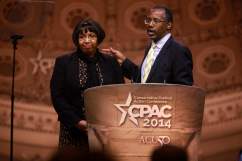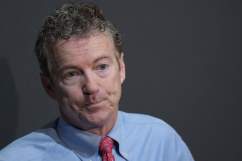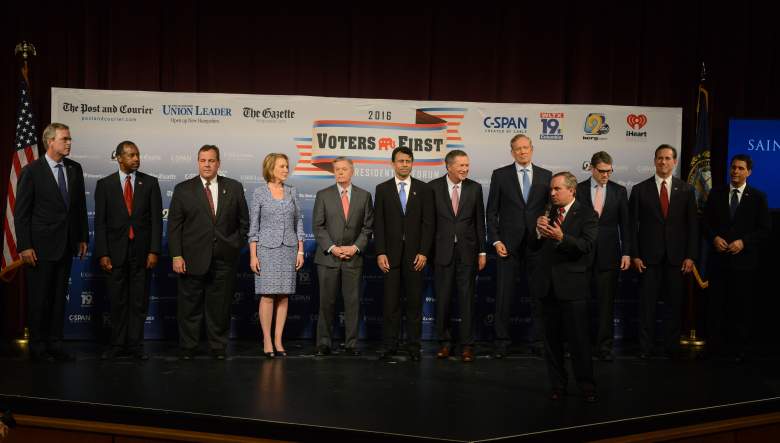
Saint Anselm College President Steven R. DiSalvo introduces (L-R) former Florida Gov. Jeb Bush, Dr. Ben Carson, New Jersey Gov. Chris Christie, former CEO Hewlett-Packard Carly Fiorina, U.S. Senator Lindsey Graham (SC), Louisiana Gov. Bobby Jindal, Ohio Gov. John Kasich, former New York Gov. George Pataki, former Texas Gov. Rick Perry, former U.S. Senator Rick Santorum (PA), Wisconsin Gov. Scott Walker stand on the stage prior to the Voters First Presidential Forum at Saint Anselm College August 3, 2015 in Manchester, New Hampshire. The forum was organized by the New Hampshire Union Leader newspaper and C-SPAN in response to the Fox News debate later this week that will limit the candidates to the top 10 Republicans based on nationwide polls. (Getty Images)
The Republican primaries season for the 2016 Presidential Election has proven to be the most exciting primaries in recent memory. Considering the large number of candidates and the explosive comments and actions of some of the candidates, the Republican debates are being seen as a potential landmine in the eyes of some analysts. The debates bear the potential to sidetrack or even destroy the Republicans’ chance to regain the White House even before the first primary vote and with frontrunner candidate Donald Trump acting unpredictably, all eyes are cast toward the first debate on August 6.
The August 6 debate, hosted by Fox News, however, will not be the only debate among the Republican primary candidates. The Republican National Committee has announced 13 debates and forums in its sanctioned list of debates, compared to the Democratic National Committee’s list of just 6 debates. These lists are still being forged and are changing regularly.
This is what you need to know:
1. The CNN Debate, Just Like the Fox News Debate, Will be Decided by Polling
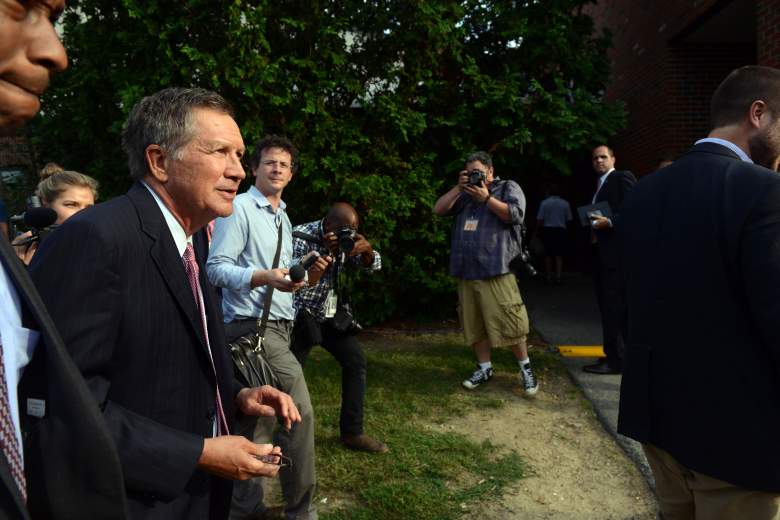
(L to R) Republican presidential candidates former Florida Gov. Jeb Bush, Dr. Ben Carson, New Jersey Gov. Chris Christie, former CEO Hewlett-Packard Carly Fiorina, U.S. Senator Lindsey Graham (SC), Louisiana Gov. Bobby Jindal, Ohio Gov. John Kasich, former New York Gov. George Pataki, former Texas Gov. Rick Perry, former U.S. Senator Rick Santorum (PA), Wisconsin Gov. Scott Walker stand on the stage prior to the Voters First Presidential Forum at Saint Anselm College August 3, 2015 in Manchester, New Hampshire. The forum was organized in response to the Fox News debate later this week that will limit the candidates to the top 10 Republicans based on nationwide polls. (Getty Images)
The next three Republican primaries debates following the Fox News debate will be the CNN/Salem Radio Republican Debate, to be held at the Reagan Library in Simi Valley, CA September 16, 2015; the CNBC Debate, to be held at the University of Colorado in Boulder October 28, 2015 and the Fox Business/Wall Street Journal Republican Debate. The location and date of the Fox Business/Wall Street Journal Debate have yet to be determined.
CNN has announced that — similar to Fox News — its debate will split the 17-candidates class for the Republican nomination into two separate debates based on polling results. According to current plans, the telecast will have two segments, with the first segment featuring the candidates that average at least 1 percent in popularity among three qualifying polls between July 16 and September 10, but were not among the top ten candidates. The longer second segment would be among the top ten candidates. The second segment can be reduced to eight spots if the qualifying class of candidates in 14 or less.
For the CNN debate, the qualifying polls are ABC/The Washington Post, Bloomberg, CBS/The New York Times, CNN ,Fox, Gallup, Marist, McClatchy, Monmouth University, NBC/The Wall Street Journal, Pew, Quinnipiac, USA Today and Time.
While this system relies on polling — which some feels is unfair, as many of the candidates are still unknown nationally — it spells out the criteria for selection, which spared it some of the criticism the Fox News debate has received.
2. Most of the Debates for Both Parties Do Not Have Sponsors or Definitive Dates Yet
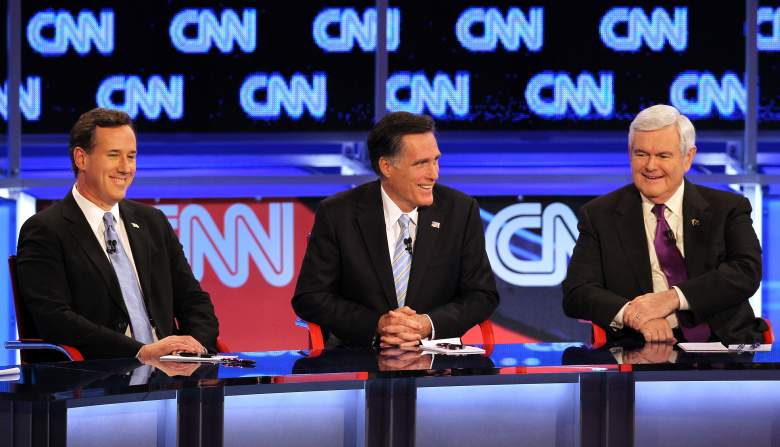
Republican presidential candidates (L-R) former U.S. Sen. Rick Santorum, former Massachusetts Gov. Mitt Romney and former Speaker of the House Newt Gingrich participate in a debate sponsored by CNN and the Republican Party of Arizona at the Mesa Arts Center February 22, 2012 in Mesa, Arizona. The debate is the last one scheduled before voters head to the polls in Michigan and Arizona’s primaries on February 28 and Super Tuesday on March 6. (Getty Images)
Currently, only five of the 19 scheduled primaries debates for both parties have both a time and location set: the Fox News Debate, the first CNN/Salem Radio Debate, the CNBC Debate, the December 15 second CNN/Salem Radio Republican Debate in Las Vegas and the February 6, 2016 ABC/IJReview Republican Debate in St. Anselm College in Manchester, NH.
This uncertainty reflects the general flux and confusion involved in presidential elections. On the Democratic side, for example, organizers assumed that frontrunner Hilary Clinton would receive the Democratic nomination without a serious challenge, so little pre-planning went into debate scheduling. On the Republican side, sponsors are currently being recruited to underwrite and host the large slate of debates. The party’s large number of currently-unsponsored debates is currently not a serious concern, but it may grow in importance if not resolved before the CNBC debate.
3. Objections by Polling Firms to How Their Polls are Being Used by the Debates Will Change Debates in the Future
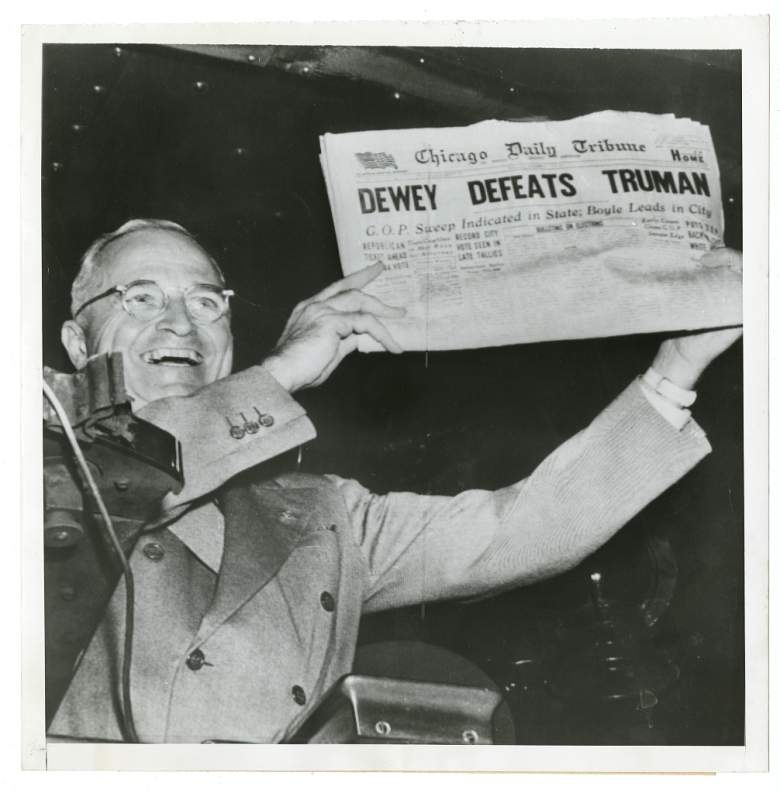
In one of the great examples of polls being wrong, Harry Truman holds up an early version of the Chicago Tribune pronouncing that New York Governor Thomas Dewey defeated the incumbent president. (Library of Congress)
The Marist Institute for Public opinion has suspended asking respondents about their choice among the 2016 presidential candidates in frustration about the possibility that their product may be used as a criteria in qualifying candidates for the Fox News debate. Marist’s concern lies in the fact that the cutoff for the candidates is within the margin of error for its polling. Fox news — according to Marist — is expecting a precision from the polls that is simply not there.
“It’s a bad use of public polls,” Marist Institute Polling Director Lee Miringoff told McClatchy, Marist’s polling partner. “It asks public polls to have a precision that ignores the margin of error. There’s a big distinction made where there’s no statistical difference.”
Miringoff also argues that the pressure to boost polling numbers is making candidates in danger of being excluded from the prime-time debate, such as Ted Cruz and Lindsey Graham, to pander for better poll numbers, such as Graham demonstrating ways to destroy his cell phone after Donald trump publicly gave out Graham’s phone number.
4. The Democrats are Hoping for a Short Primary Season, While the Republicans are Planning for a Fight to Super Tuesday and Beyond
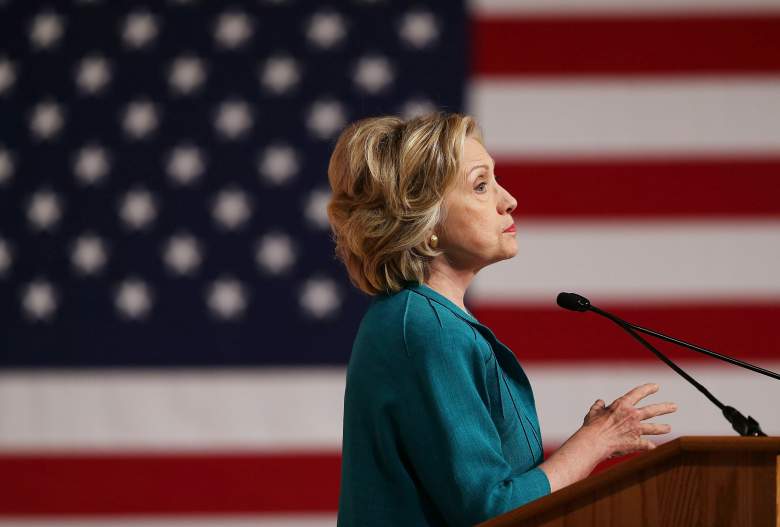
Democratic Presidential hopeful and former Secretary of State Hillary Clinton calls for an end to the Cuban trade embargo as she gives a policy speech at the Florida International University on July 31, 2015 in Miami, Florida. According to polls Clinton continues to lead the Democratic candidates running for the Democratic nomination. (Getty Images)
The Democrats’ season of just six debates represent an uncertainty among Democrats. With challenges to frontrunner Hilary Clinton only materializing two months ago, the Democratic National Committee is scrambling to create a debate format it was sure would not be necessary a year ago.
In contrast, the Democrats held 26 debates during the 2007-2008 primary season. By August 4, 2007, 5 debates were completed among the Democrats.
Currently, the DNC has not released the criteria for participating in the debates, lest alone the actual date and location of the first debate. Democrats may be concerned that the 2015-2016 primaries may mirror the 2007-2008 primaries, which was highly contentious and fractured the unity of the Democratic Party. The match-up between Hilary Clinton and her nearest rival — Vermont Senator Bernie Sanders — bears the possibility of dividing the party between progressives and centrists.
Candidates are also blocked from participating in non-DNC sanctioned debates. According to a statement announcing the debates, “While a six sanctioned debate schedule is consistent with the precedent set by the DNC during the 2004 and 2008 cycles, this year the DNC will further manage the process by implementing an exclusivity requirement. Any candidate or debate sponsor wishing to participate in DNC debates, must agree to participate exclusively in the DNC-sanctioned process. Any violation would result in forfeiture of the ability to participate in the remainder of the debate process.”
In contrast, the republicans have scheduled a traditional debate schedule similar to their 2012 schedule, with the final debate schedule one week before Super Tuesday — when a majority of the states hold their primaries.
5. No One is Sure What Donald Trump’s Candidacy Will Mean for the Debates or the Primaries Season
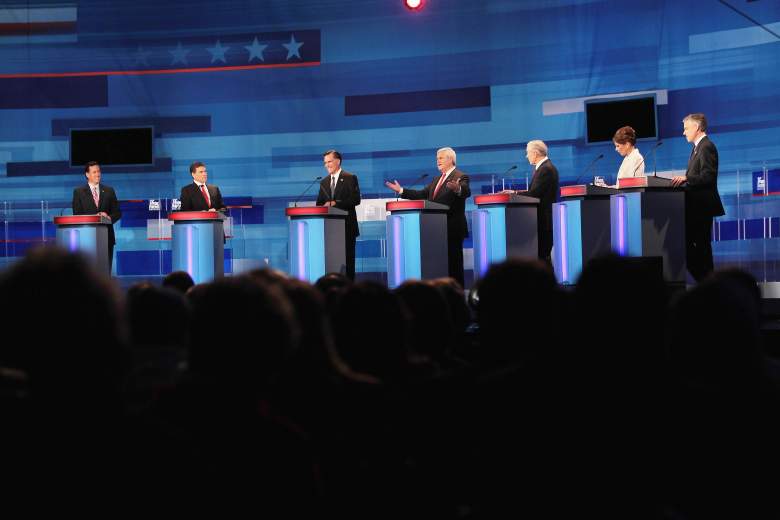
Republican presidential candidates (L-R) former U.S. Senator Rick Santorum (R-PA), Texas Gov. Rick Perry, former Massachusetts Gov. Mitt Romney, former Speaker of the House Newt Gingrich, U.S. Rep. Ron Paul (R-TX), U.S. Rep. Michele Bachmann (R-MN), and former Utah Governor Jon Huntsman Jr. field questions during the Fox News Channel debate at the Sioux City Convention Center on December 15, 2011 in Sioux City, Iowa. The GOP contenders are in the final stretch of campaigning in Iowa where the January 3rd caucus is the first test the candidates must face before becoming the Republican presidential nominee. (Getty Images)
Donald Trump, for the most part, is a wild card when it comes to the Republican debates. Trump represents the opposite of what the RNC intended for the 2015-2016 primaries: avoidance of occasions for fringe candidates to snipe at potential party nominees and for potential party nominees to veer to the party’s extremes in ways that would ultimately hurt them in the general election. Fox News’ qualification process would have kept the most extreme candidates away from the “serious” candidates. However, Trump’s candidacy and the notion that he is the current frontrunner means that during the Fox News debate, the “serious” candidates will have to defend themselves from a candidate that has taken joy in attacking and humiliating his opponents.
Trump — despite his flaws — speaks to a part of the Republican mainstream underserved traditionally by the mainstream. For example, in his analysis of the 2012 Republican debates, pollster David Winston found that “Though Republican voters consistently said (in primary exit polls and surveys) that economic issues were their top priority in determining who to vote for, questions about the economy were largely underrepresented throughout the debates.”
With Trump offering answers to the questions Republican voters care about — immigration, taxes, the Affordable Care Act and so on — and with Trump stroking the anger the voting base has with these issues, it is likely that he will be involved in the Republican primaries all the way to the convention. What this may mean for the party’s future nominee is anyone’s guess.


